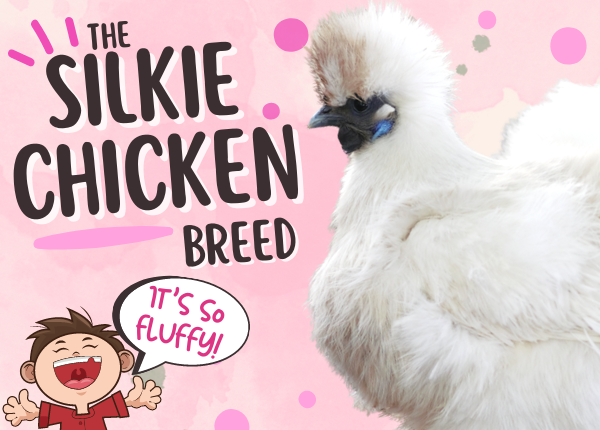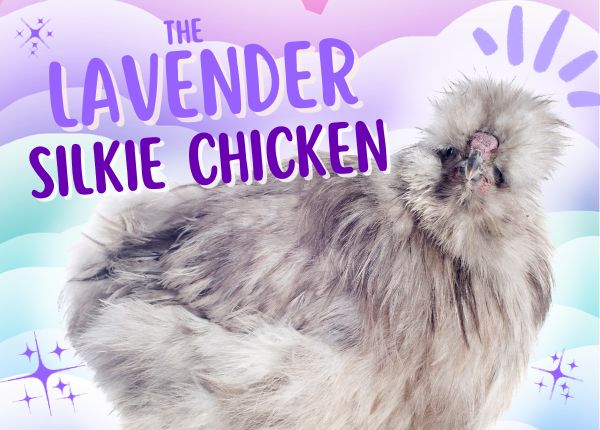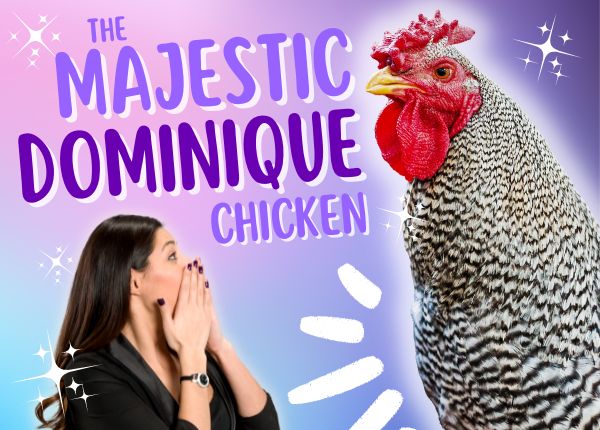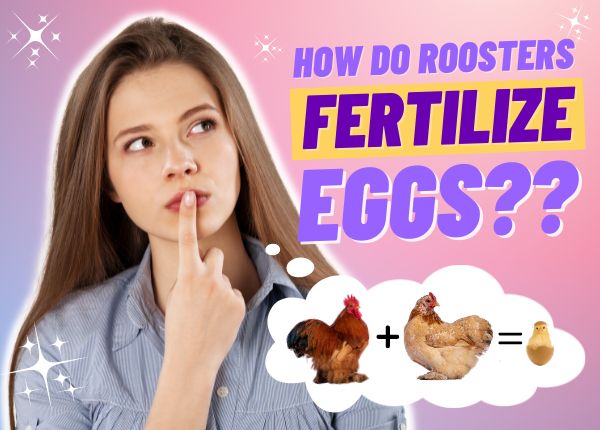
They're just SO FLUFFY! Who doesn't want one of these loveable little ground clouds tottering around their feet seeking out snuggles and snacks?
Silkies are the fluffiest, friendliest little bantam beauties on the block. They're super-affectionate, easy to handle, low maintenance, and divine to look at.
Some people aren't that into chickens…I know. I'm sorry, but it's true. Even the questionable folk of the world who don't share our love of livestock can recognize a Silkie from any other chicken breed. Why? Because they are wonderfully unique in every way. I am SO team Silkie!😍
In the interest of being balanced (I'm not – see above - I'm team Silkie) this breed won't lay as many eggs as other chickens out there. If you're looking at smaller chooks, I'm guessing egg yield isn't at the top of your wish list anyway? Silkies are however the most maternal mini mamas imaginable. Give her an egg, or a golf ball, and she'll plonk her booty on it!
The best way I can think of to describe this breed is with the reference to 'It's so fluffy I'm Gonna Die' scene from despicable me. IYKYK (if you know, you know), and if you don’t press play for a laugh!
Get to what you want fast:
Contents and Quick Navigation
Meet the Silkie:
- Why Are Silkies So Unique?
- What Are the Recognised Variations of Silkie Chicken?
- What's the Silkie Chicken Breed Standard?
- Is the Silkie a Bantam Chicken?
- How Big Are Silkie Chickens?
- Do Silkies Like to Be Handled?
- Are Silkie Chickens Good with Kids?
- Are Silkie Chickens Suitable for Beginners?
- Are Silkie Chickens Noisy?
- Do Silkie Chickens Mix Well with Other Breeds?
- Which Breeds of Chicken are Calm Natured?
- Why Can't Silkie Chickens Get Wet?
- What's a Pennaceous Feather?
- What Health Issues Do Silkies Have?
- Do I Have to Groom My Silkie Chicken?
- How To Care for Your Silkie?
- What's The History of The Silkie?
A Look at Silkie Eggs:
- How Many Eggs Does a Silkie Lay?
- How Big Are Silkie Eggs?
- Can I Eat Silkie Eggs?
- How Long Do Silkies Lay For?
- Do Silkie Chickens Lay in the Winter?
- Are Silkie Chickens Broody?
- Is The Silkie the Right Chicken Breed for Me?
- Why Shouldn't I Chose a Silkie Chicken?
- How Do Other Chicken Keepers Rate Silkie Chickens?
It's my pleasure to introduce you to the cutest, cuddliest, kindest mama in the coop. Meet the Silkie!

Why Are Silkies So Unique?
Silkies stand out from the chicken crowd in every way. Their characteristic fluffy, down-like feathers are the reason they're called silkies: they're silly-soft to touch. You absolutely should judge this birdy book by its cover as Silkies are as soft on the inside as they are on the outside. Their nurturing nature and affectionate personalities are another reason we're so drawn to them (but mainly it's 'cos they're so cute).
Silkies also have rare dark blue or black skin hidden underneath all their fluff. Chicken skin is usually white. The rare melanism in Silkie's connective tissues is caused by fibromelanosis: a mutation believed to come from Asia.

Oh, and they have bonus toes! Silkie chickens have five toes. That won't sound weird if you're new to keeping chickens, but as all other breeds have four toes, it is.

Polydactyly – or extra digits – is expected as a breed standard, so long as the funky fifth toe grows directly off the fourth. Six-toed Silkies have been seen about town, but they wouldn't be accepted by breed standards. Apparently, that’s one toe too far!
Silkies even have uniquely turquoise earlobes! No need for earrings. They're literally little bundles of specialness.

What Are the Recognised Variations of Silkie Chicken?
There are ten commonly acknowledged colors of Silkie chicken, although the American Poultry Association (APA), accepts only six of these:
- White
- Black
- Blue (my personal favorite!)
- Buff
- Partridge
- Splash

Other color variants include Red, Gray, Lavender and Cuckoo, but they're not officially accepted yet.

White Silkies are by far the most popular of these variants, probably because they look like little snowballs.
Each of these color variants can be found in a bearded or non-bearded variety. In the U.S. most Silkies are bearded and have a little extra tuft of fluffy loveliness under their beak. Yes, that's right, she's a bearded lady, and she wears that thing with pride.

In Europe, most Silkies are non-bearded meaning their faces and funky turquoise earlobes are a bit easier to see.
What's the Silkie Chicken Breed Standard?
Silkies should be round, small, stout chickens with rounded fluffy tails. Fluff should be everywhere!🙌🏼
Ladies should have pom-pom hairstyles and gents should be rocking the Elvis look with shiny ‘streamer’ feathers pointing backward. Silkies should have dark skin, five toes, turquoise-blue or mulberry earlobes, and fit within breed size guidelines.

Is the Silkie a Bantam Chicken?
Silkies are genuine bantams. It's confusing when you hear the term 'standard-sized Silkie' because in Silkie speak, the standard is a bantam.
Large fowl variants were bred up from the bantams in Europe, and they are now accepted as standard-sized Silkies, with the original variant accepting the bantam label just to differentiate between the two. Don't read too much into the words 'large fowl' though. It's like comparing teeny with tiny. They're all dinky!
In the U.S. anything bigger than a bantam Silkie, is just not a Silkie. Keep this in mind when you're looking at stats and sizes!
How Big Are Silkie Chickens?
Male bantam Silkies weigh 36 oz, and female bantam Silkies weigh 32 oz. These are the U.S. expectations.
The British Poultry Standard for bantam Silkies is smaller, stating that male bantams should weigh 22oz, and female bantams should weigh just 18oz.
Large fowl Silkie roosters should weigh 4lbs and silkie hens should weigh 3lbs.
Silkies average 8-14 inches tall and 27.6 inches in length. They're round and short little chickens!

Do Silkies Like to Be Handled?
Silkies are softies, inside and out! They love a cuddle, are super-affectionate, and will snuggle into your lap for a fuss without a second thought. They're gorgeous, they're polite, they're quiet, they're friendly, they're…well they're the perfect poultry pets!
Are Silkie Chickens Good with Kids?
Silkies are a top choice for kids. Even the grumpiest five-year-old will cheer up when they look at this lump of lovableness. They're light and easy to handle, they love a fuss, they're mild-mannered, and they're not flighty or fussy.
You can't have a melt-down when you're snuggling a Silkie. They are even used as PAT (Pets As Therapy) animals. If any chicken breed is going to tame a tantrum – this is the one!

Are Silkie Chickens Suitable for Beginners?
They're totally doable for beginners! Silkie's look all lah-de-dah and fancy-pants, but actually, they're super-sweet softies. They're easy-going, relatively low-maintenance chickens who are easy to handle and care for. Silkies are a great beginner's choice.
Are Silkie Chickens Noisy?
Silkies are so quiet that I'd let you off if you forgot you had them (Shh emoji). One of the best things about Silkies is how well suited they are to homes with, shall we say, 'not-so-chick-keen' neighbors.
Mama hen is even considerate when she's laying her egg, and her egg song is subtle and sweet in comparison to other breeds. If only more new mammas were less mouthy on the maternity ward (I'll never forget about you, bed 12!)
Silkie roosters are less likely to crow and compete with other roosters than most chicken breeds. When they do pipe up, they even crow a bit oddly. They 'call' rather than 'cock-a-doodle-doo'. Take a listen...
Do Silkie Chickens Mix Well with Other Breeds?
Silkies are small, docile, friendly, and happy little chickens. They won't start a fight; they're too busy being beautiful. They'll mix fine with other friendly breeds, but if you have a bossy bird in your yard, the green-eyed monster may kick in and they might bully this gentle little lady. She's like the cute but quiet girl in class. Look after her, yeah?

Which Breeds of Chicken are Calm Natured?
If you're after some soul mates for your Silkies, then you should check out these chooks:
You don't have to keep only bantams: Jersey Giants have big bottoms and big hearts. Brahmas, Cochins, Orpingtons, Plymouth Rocks, Dorkings, Sussex, and Cornish Chickens are all great breeds to keep with docile yet fragile Silkies.😍
Are Silkie Roosters Aggressive?
Boys will be boys. Even Silkie roos are full of attitude when they feel they have to be. Some Silkie keepers say they find the roosters to be calmer and quieter than those of other breeds, and Solo Silkie roosters are less likely to bother crowing or making a fuss than if you keep two or more.
Silkie roos are great dads, too. They're so soft-natured they've been known to share feed with their chicks, which is not a common chicken-dad trait.
How can I tell a Silkie Hen from a Rooster?
Silkies are hard to sex until they're fully grown at 3 to 4 months old. They're slower to mature than other chicken breeds, so you'll be awaiting your first egg or crow before you find out if you have a Charlie or a Charlene in your coop. You'll have to be prepared to love him (or her) either way!

What's The Lifespan of a Silkie?
Silkie's live for 7-9 years. They might totter happily at your side even longer than that if you treat them well with premium health care and secure predator free housing.
Why Can't Silkie Chickens Get Wet?
Silkie chickens feathers cannot handle wet or damp conditions. This isn't debatable. They do not do damp, period!
If you want to know the technical reason, then read on to find out more about unbarbed pennaceous feathers.
If those techy words just made you frown and you're not fussed about the facts, then just think the Silkie's hair-do. Would you want to get that posh fro wet? Egg-sactly.

Photo credit: Karolina Wv via Bored Panda
What's a Pennaceous Feather?
A pen-what-now? All birds have strong flight feathers on their tails and wings and down feathers which keep them insulated and warm. Some bird breeds, like the Silkie chicken, have pennaceous or contour feathers too. It's the Silkie's unusual – technically faulty - contour feathers that give the breed its infamous furball look.
Pennaceous feathers have colored tips that form the patterning on the chicken, and then they morph into a more down-like feather towards the base. Clever, science folk explain how Silkie chickens are homozygous for a recessive allele (or something like that) which results in hookless pennaceous feathers.
This is kind of like when kids chew their zippers so they don't interlock anymore. The feathers lose their structure and look more like bunny fluff as a result, and they don't keep the rain out.

If you crossbreed a Silkie with any other chicken, you won't get a 'slightly-silky' chicken. The gene that makes those feathers so darn fluffy is recessive, so any crossbreeding will sacrifice their softness completely. Don't do it. Why would you?
What Health Issues Do Silkies Have?
Silkies are healthy little hatchlings, most of the time. Some strains of Silkie might suffer from a hereditary predisposition to Mareks disease. Most good breeders will have handled this for you, but you can always vaccinate if needed.
Being fluff bombs makes it hard to spot pesky parasites, so sneaking a little inspection into snuggle time is well worth doing. Make sure you do your homework on managing pests whatever breed of chickens you keep. Prevention is always better than cure when it comes to these little critters.
Silkies have vaulted heads, which makes them prone to head injuries if they're bullied by bigger breeds. Being nice doesn't always work out well – it makes Silkies generally venerable to attacks and predation.
Do I Have to Groom My Silkie Chicken?
No, but you might want to! When you take on a super-fancy dog breed you know you're in for top-whack grooming bills, but Silkies rank high in wow factor and low in maintenance. Amazing, right?
They'll preen and dustbathe themselves to keep their stylish little top knots looking fabulous, but if they do get a bit ick around their fluffy bottoms, a quick rinse and towel dry will do the job.
If you want to show your Silkie off at shows – which you will – they're the kinda gal who will lap up a Spa Day! Fluff her, preen her, and trim her nails, and blow dry her. She'll enjoy the fuss and you'll enjoy the adoration!
Some Silkie owners trim their chicken's tufts a little to help them see. Some opt for an 80's Alice band. Looking good girls!
 How To Care For Your Silkie:
How To Care For Your Silkie:
Silkies are small and low maintenance and will be fine with 3 square foot of coop per chicken. They're only ickle, they don't need much space, but they do need some consideration:
Silkies still need run space, but they can't fly, and they scream "eat me – I'm a delectable sweet marshmallow" to predators, so you'll need a plan to keep them safe.
As they can't fly at all they'll need a low roost bar, and often prefer to sleep on the floor.
They'll need to be paired with other friendly breeds and whilst they shouldn't need any grooming, just keep an eye on their fluffy feet and hidden skin to make sure they don't suffer from hard-to-spot parasites.
What's The History of The Silkie?
The history of the Silkie goes back at least 1000 years when it was first noted in South-East Asia. Nobody knows egg-sactly where the first Silkie hatched, but it's obvious that this ornamental, oriental gem has some Japanese or Chinese heritage. They're sometimes referred to as the Chinese Silk Chicken.
Marco Polo made a note in his journal about a furry chicken he spotted in China in the 13th century – that's gotta be this girl, right!?
When Silkies found their way to North America and Europe, they were considered a bit freakish with their strange fluffy feathers. Silkies were sometimes shown at the circus and said to be half mammal, and early Dutch breeders told their customers that they were half rabbit. (The real Easter Bunnies?)
Silkies are sought after for their silky-soft feathers, not their egg-based abilities. But, if you're homing a chicken, you'll egg-spect something in return, right?
Let's Look At Silkie Eggs

How Many Eggs Does a Silkie Lay?
Silkies lay 2-3 eggs per week, so around 150 eggs per year is most realistic. They're classed as poor egg layers, but I'd argue that's subjective. The eggs they lay are small, but not silly small for a bantam breed.
We asked our network of Silkie owners how eggy their girls really were, and 60% said they received 4 eggs per week. Some super-momma Silkies were laying 5 eggs per week! However, there were some free-loaders being chicken-shamed about their meagre 2 eggs per week.
"Silkie bantams are renowned for laying small eggs and depending on the climate & environment you live in; this determines how many eggs you are likely to get per week. I have personally owned silkies, I hatched my girls I and they grew to lay all through winter and I averaged 5 eggs per week, they were fantastic consistent layers."

How Big Are Silkie Eggs?
Silkies lay small, cream-colored or speckled eggs. You didn't egg-spect me to say medium-large did you? Ouch.

Can I Eat Silkie Eggs?
Y'all better! They're considered a backyard breed, and Silkie eggs are said to be richer in all the good stuff than most other eggs; including nutritive constituents, oxidative stability, and rheological properties.
I don't really get it either, but according to a recent study conducted byDepartment of Foods and Nutrition in Japan, basically Silkie eggs are healthier for you than chowing down on the eggs of any other chicken breed. She's good, isn't she?
How Long Do Silkies Lay For?
Silkies start to lay at 7 to 9 months of age. It might take some pullets a bit longer, but don't sweat it if yours is one of the late starters: the later a pullet starts to lay, the better she seems to do in the long run.
Silkie's will lay the most eggs in their first season, then they'll continue to line your tummy with yummy little eggs until they're two years old. Your lady might keep treating you until she's four, if you're clucky.
Do Silkie Chickens Lay in the Winter?
Silkies might be considered a bit below average when it comes to egg production, but they lay consistently throughout the colder months. Mama Silkie is like a fluffy little tea cozy: those Silkie eggs don't even know it's cold out there.
Are Silkie Chickens Broody?
Silkies are insanely broody! They make the most blooming-marvelous moms and are described as being the broodiest bird on the block when it comes to chicken breeds.
Silkie hens are so broody, that if you leave your phone lying around their coop, they'll probably perch their butt on it and enter a broody trance. Be warned.
Their maternal nature is somewhat abused commercially, and Silkies are the go-to-nanny for hatching eggs of other less-successful mothers. We're not just chatting chickens here! They'll hatch eggs for geese, ducks, quails and pheasants. Give the girl an egg and she'll hatch it! She's professional momma material.

Is The Silkie the Right Chicken Breed for Me?

Most likely, yeah! Silkies tick so many boxes when it comes to looks and lovableness that they're hard to hate. They're not the smallest bantam, but I think they're the cutest and the sweetest.
Get a Silkie, then tell me you haven't fallen in love with it. I challenge you. You won't be able to do it.
If you have a reluctant mother hen (or swan or ostrich) and you're looking to recruit a nanny, then the Silkie it is. Just don't give her a croc egg, that's taking the mick a bit.

Why Shouldn't I Chose a Silkie Chicken?
If you're after lots of large eggs, there are much better breeds out there to tend to your tummy.
Silkies are also useless at evading predators, so if you're after a tough old bird who'll roam free and karate chop the first fox to look her way, Silkie here is not your hen.
How Do Other Chicken Keepers Rate Silkie Chickens?
Silkies find a way into your heart. If you take one on now, you'll probably be a Silkie-crazy lady by this time next year and have at least one in every color. Don't say I didn't warn you.
97.6% of the 207 Silkie owners we asked would keep the breed again. That's a pretty good review in my eyes.

Silkies rank right up there with the best of the breeds and score a silky-smooth 4.5 out of 5 in the Chicken Choice Awards.
"Silkies are excellent layers of relatively large-sized bantam eggs, and unlike most other breeds, silkies will continue laying eggs throughout the winter because their fluffy feathers keep them warm and content. In addition to being great egg layers, silkies are known for being the broodiest of all chicken breeds and are often used to incubate and raise the offspring of other poultry."(Successful Farming)
If there's something you'd like to know – or share – about this fab little fluff-bomb breed, please do!
There is never too much to know about the sweet little Silkie!
You wouldn't take home a kitten or a puppy without learning how to love them first. Some elements of pet ownership come naturally, but even the most experienced chicken owners out there find themselves scratching their heads daily over a random noise or an odd walk.
Learning how to love your pet should be fun and keeping chickens should be rewarding – emotionally and in the kitchen department.
Chickenpedia is the perfect place to learn how to care for - and prepare for - your chickens. You'll have unlimited access to reliable information, expert guidance, real-world tips, and reassuring chats on all things chickeny.
Right, I'm off to source me some more Silkies…












Amy
May 08, 2022
Im a new silkie keeper and I could not be happier. They’re so calm and fluffy! They may not lay the most eggs, but when they do, it’s so special. Thank you for a incredible helpful article.